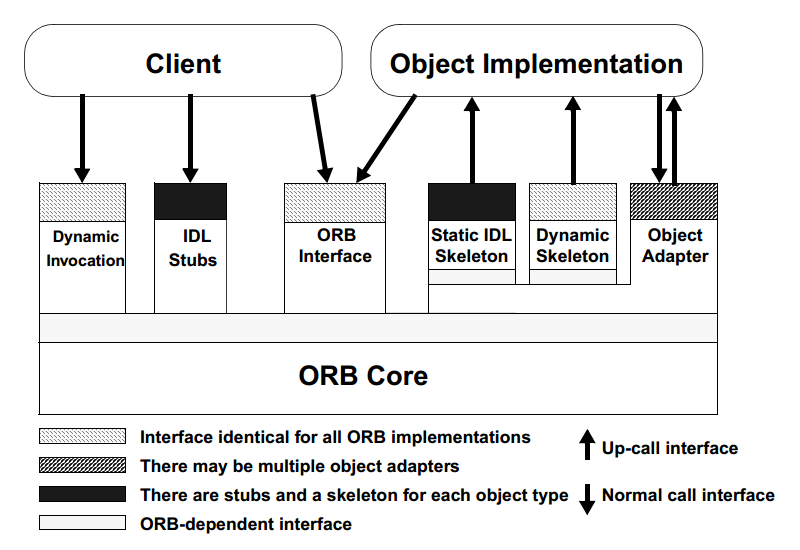本文主要内容涉及:
- CORBA基本架构
- IDL文件编写
- POA示例实现
- POA+TIE示例实现
- ImplBase示例实现
- ImplBase+TIE示例实现
- Persistent示例实现
ImplBase主要是为了兼容旧代码所提供的,正常情况下,大家是不需要使用的。
JDK提供了工具,可以直接生成stubs及skeletons接口代码:
idlj -fall -oldImplBase Hi.idl
编写server端代码:
import HiCorba.*;
import org.omg.CosNaming.*;
import org.omg.CosNaming.NamingContextPackage.*;
import org.omg.CORBA.*;
import java.util.Properties;
class HiImpl extends _HiImplBase{
private ORB orb;
public void setORB(ORB orb_val){
orb = orb_val;
}
// implement sayHiTo() method
public String sayHiTo(String someone) {
return "\nHi, "+someone+" !"+"\n";
}
// implement add() method
public int add(int numa, int numb) {
return numa+numb;
}
// implement shutdown() method
public void shutdown() {
orb.shutdown(false);
}
}
public class HiServer {
public static void main(String args[]) {
try{
// create and initialize the ORB
ORB orb = ORB.init(args, null);
// create servant and register it with the ORB
HiImpl hiImpl = new HiImpl();
hiImpl.setORB(orb);
// get the root naming context
org.omg.CORBA.Object objRef = orb.resolve_initial_references("NameService");
NamingContext ncRef = NamingContextHelper.narrow(objRef);
Hi href = HiHelper.narrow(hiImpl);
// bind the Object Reference in Naming
NameComponent nc = new NameComponent("Hi", "");
NameComponent path[] = {nc};
ncRef.rebind(path, href);
System.out.println("HiServer ready and waiting ...");
// wait for invocations from clients
orb.run();
}
catch (Exception e) {
System.err.println("ERROR: " + e);
e.printStackTrace(System.out);
}
System.out.println("HiServer Exiting ...");
}
}
编写client端代码:
import HiCorba.*;
import org.omg.CosNaming.*;
import org.omg.CosNaming.NamingContextPackage.*;
import org.omg.CORBA.*;
public class HiClient{
public static void main(String args[]){
try{
// create and initialize the ORB
ORB orb = ORB.init(args, null);
// get the root naming context
org.omg.CORBA.Object objRef = orb.resolve_initial_references("NameService");
NamingContext ncRef = NamingContextHelper.narrow(objRef);
// resolve the Object Reference in Naming
NameComponent nc = new NameComponent("Hi", "");
NameComponent path[] = {nc};
Hi hiImpl = HiHelper.narrow(ncRef.resolve(path));
System.out.println("Obtained a handle on server object: " + hiImpl);
System.out.println(hiImpl.sayHiTo("neohope"));
System.out.println(hiImpl.add(70, 80));
hiImpl.shutdown();
}
catch (Exception e) {
System.out.println("ERROR : " + e) ;
e.printStackTrace(System.out);
}
}
}
编译代码:
javac *.java HiCorba/*.java
测试,在三个shell或cmd窗口中依次运行:
#shell01 orbd -ORBInitialPort 1900
#shell02 java HiServer -ORBInitialPort 1900 >>HiServer ready and waiting ... >>HiServer Exiting ...
#shell03 java HiClient -ORBInitialPort 1900 -ORBInitialHost localhost >>Obtained a handle on server object: IOR:000000000000001349444c3a4869436f7262612f 48693a312e30000000000001000000000000006e000102000000000d3139322e3136382e35362e31 000074c300000019afabcb0000000002768712000000000800000001000000001400000000000002 00000001000000200000000000010001000000020501000100010020000101090000000100010100 00000026000000020002 >>Hi, neohope ! >>150

